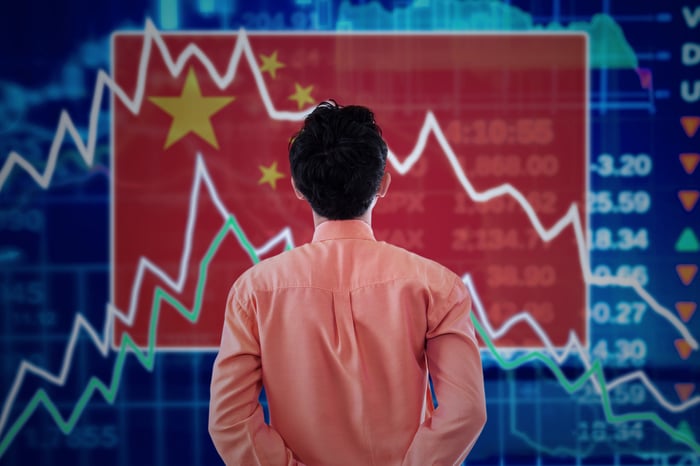What happened
Shares of Chinese property behemoth China Evergrande Group (EGRN.F), as well as shares of the China Evergrande Group (EGRN.Y) American depositary receipts, exploded higher in Wednesday morning trading, rising 40.1% and 47.5% respectively, through 10:25 a.m. EDT, and pulling up the share prices of other Chinese stocks in their wake. For-profit Chinese education company Gaotu Techedu for example -- which has problems of its own -- jumped 12.4%.
That's a big turnaround from the 31% China Evergrande stock was down, from Friday's close, on Tuesday. And an even bigger turnaround from the near-90% loss China Evergrande investors have endured over the past 14 months as fears of bankruptcy loomed. But why did it happen?

Image source: Getty Images.
So what
A couple of factors seem to be working this morning to calm investors' panic over the prospect of China Evergrande going insolvent. For one thing, it might not be insolvent. As television network Euronews reports this morning, Evergrande subsidiary Hengda Real Estate Group has just informed the Shenzhen Stock Exchange that it has successfully negotiated a plan to pay interest on a bond due in 2025. Additionally, Bloomberg reports that Evergrande is prepared to make a 30.5 million euro interest payment on one of its own bonds.
That's good news for investors in Evergrande, and in the Chinese stock market in general, in the short term. Longer-term risks still exist, of course, but in an article this morning, CNBC pooh-poohed the chance of Evergrande taking down the Chinese economy as a whole, pointing out that while Evergrande's debts are substantial (more than $300 billion), they make up only about 6.5% of total debt in the Chinese property sector.
Worries about systemic risks from Evergrande, therefore, said ING head of research for the Asia Pacific region Rob Carnell, are "a bit overdone." While the company's debts are certainly large, CNBC points out that Evergrande does have physical assets (land and buildings) worth $220 billion. That's not enough to cover all the company's debts, admittedly, but in the event of insolvency, it should be enough to pay back investors a lot more than the $0.25 on the dollar that the company's bonds are currently selling for -- especially if the Chinese government steps in to buy back some of Evergrande's properties.
Now what
And yet, all of the above does seem to assume that insolvency is coming, and this crisis isn't over yet, as more and more interest payments come due.
As The Wall Street Journal observed this morning, "the real test" for Evergrande could arrive as early as tomorrow, when the company is supposed to pay an $83.5 million coupon on a dollar-denominated bond. Failure to pay that interest on time would start the clock on a 30-day grace period, giving Evergrande time to pull a rabbit out of the hat, but probably shaking investor confidence -- and Evergrande's stock price -- even further.


